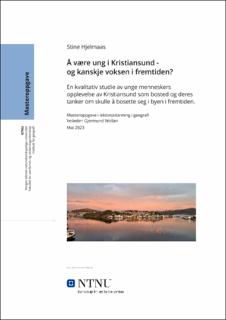Å være ung i Kristiansund - og kanskje voksen i fremtiden?
Master thesis
Permanent lenke
https://hdl.handle.net/11250/3080073Utgivelsesdato
2023Metadata
Vis full innførselSamlinger
- Institutt for geografi [1120]
Sammendrag
Norge står ovenfor flere demografiske utfordringer. Urbanisering, sentralisering og en aldrende befolkning medfører bekymring, særlig for distriktene som opplever nedgang i befolkningen. Også små- og mellomstore byer vil i fremtiden oppleve en stabil eller fallende befolkningsutvikling. Tilflytting til disse byene, spesielt av unge mennesker, er derfor viktig for at de skal kunne utvikle næringslivet og skape levende lokalsamfunn. Dette kan videre gjøre det mer attraktivt å bo i distriktskommunene omkring. Mange kommuner arbeider med tilbakeflytting, da man antar at forholdet tilbakeflytterne har til stedet gjør at de blir boende. På denne måten kan tilbakeflytting bidra til å holde folketallet stabilt.
På bakgrunn av dette har jeg i denne masteroppgaven valgt å ta utgangspunkt i Kristiansund, som i norsk kontekst betegnes som en mellomstor by. Formålet med studien er å belyse unge menneskers opplevelse av Kristiansund og deres tanker om å skulle bosette seg i byen i fremtiden. Metoden som er brukt er kvalitative intervjuer, både med unge mennesker som fremdeles bor i Kristiansund, og unge mennesker som har flyttet fra byen.
Funnene viser at unge mennesker har positive opplevelser av Kristiansund som bosted. Dette knyttes til et trygt oppvekstmiljø, en livsstil med korte avstander og nærhet til natur, gode kulturtilbud og et sosialt miljø som er preget av fellesskap og stort engasjement for byen. Det de derimot savner, er liv i sentrum med et bredere utvalg av tjenestetilbud i form av butikker restauranter og cafeer. Dette er også hovedgrunnen til at de unge ønsker å flytte eller har flyttet, noe som sees i sammenheng med deres livsfase. Videre ønsker de fleste å bosette seg i byen i fremtiden. Dette knyttes til tradisjonelle flyttemotiver som nærhet til venner og familie, samtidig som det er et valg av preferanse for en bestemt livsstil. Det som derimot kan hindre tilbakeflytting er mulighetene for relevant arbeid i byen i tilknytning til deres utdanninger. Norway is facing several demographic challenges. Urbanization, centralization and an aging population cause concern, particularly for the districts which are experiencing a decline in population. Small and medium-sized cities will also experience stable or declining population growth in the future. Migration to these cities, especially of young people, is therefore important for them to be able to develop business and create vibrant local communities. This can also make it more attractive to live in the surrounding district municipalities. Many municipalities work with return relocation, as it is assumed that the relationship the returnees have with the place, means that they will stay. In this way, return migration can help to keep the population stable.
This master's thesis deals with what in the Norwegian context is classified as a medium-sized city, Kristiansund. The purpose of the study is to shed light on young people's experience of Kristiansund as a place to live and their thoughts about settling in the city in the future. The method used is qualitative interviews, both with young people who still live in Kristiansund, and young people who have moved from the city.
The findings show that young people have positive experiences of Kristiansund as a place to live. This is linked to a safe growing up environment, a lifestyle with short distances and closeness to nature, good cultural offerings and a social environment characterized by community and great commitment to the city. What they miss, however, is a vibrant city center with a wider range of services in the form of shops, restaurants and cafes. This is also the main reason why they want to move or have moved to larger cities, which is seen in connection with their life phase. Furthermore, most of them want to settle in Kristiansund in the future. This is linked to traditional motives for moving such as living close to friends and family, while at the same time it is a choice of preference for a certain lifestyle. On the other hand, what can prevent them from moving back, is the opportunity for relevant work in the city in connection to their education.
